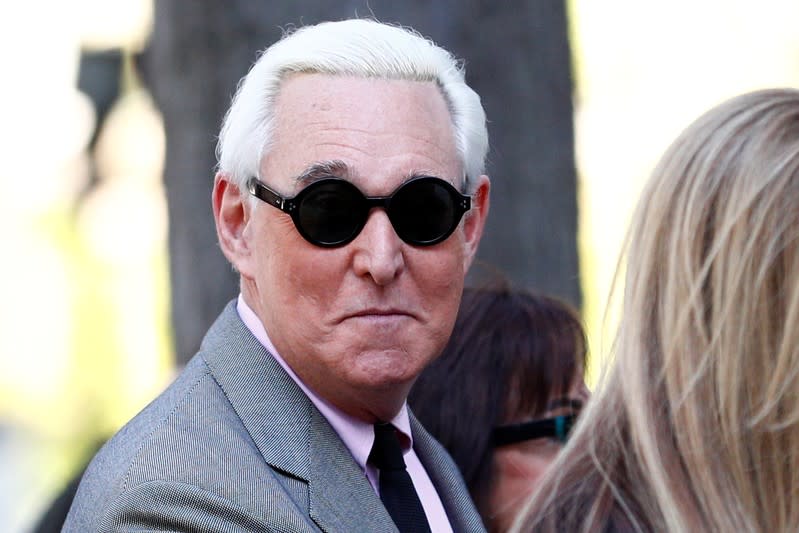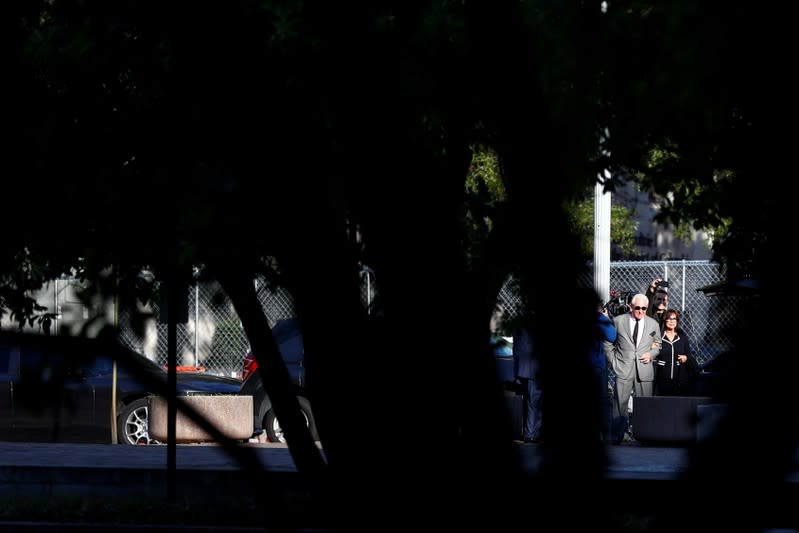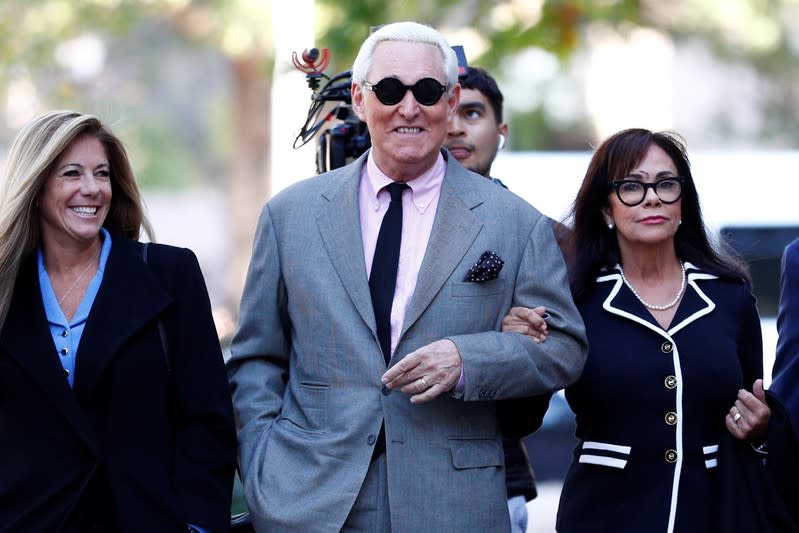Longtime Trump adviser Roger Stone takes ill during jury selection for trial
By Sarah N. Lynch
WASHINGTON (Reuters) - President Donald Trump's longtime adviser Roger Stone, looking pale and sick, left a federal courthouse complaining of food poisoning on Tuesday as his trial began with jury selection in a case stemming from former Special Counsel Robert Mueller's probe that detailed Russian interference in the 2016 U.S. election.
The 67-year-old veteran Republican political operative - a self-described "dirty trickster" and "agent provocateur" - has pleaded not guilty to charges of obstructing justice, witness tampering and lying to the U.S. House of Representatives Intelligence Committee.
Stone appeared ill during the proceedings in which jurors were being chosen from a pool of about 80 people. He cradled his forehead in his hands, had a sweaty brow, leaned on his wife while walking and left the proceedings at midday, telling the U.S. District Judge Amy Berman Jackson he had food poisoning.
"I want to apologize to the court. I don't want to waste the court's time," Stone told Jackson, as he waived his right to participate in the jury selection process. "I hope to be better tomorrow."
"I will excuse you. I hope you get rest," Jackson told him.
Jury selection got off to a slow start, with the judge denying most of the requests by defense lawyers to exclude potential jurors they fear could be biased against Stone.
Opening statements could begin as soon as Wednesday, and the trial could last at least two weeks. Prosecutors said they expect to be able to rest their case against Stone by next Tuesday or Wednesday.
Stone, wearing a gray suit and sunglasses, earlier arrived at the courthouse in the U.S. capital to a mixture of jeers and cheers.
"Hey, you're going to get to see Manafort," one person yelled, referring to Trump's former campaign chairman Paul Manafort, who is now serving a prison sentence of 7-1/2 years. Others shouted "Roger Stone did nothing wrong."
At the outset of Tuesday's proceedings, Jackson said she would not agree to strike prospective jurors just because they work for the federal government or because they have opinions about Trump.
That warning did not stop Stone's lawyers from trying to strike the very first one, a woman who once served as a communications director for the White House Office of Management and Budget under Democratic President Barack Obama and whose husband is a Justice Department national security attorney.
"She said credibly she doesn't have an opinion on this case," Jackson said as she denied the motion.
'VERY CORRUPT'
The judge also blocked subsequent efforts by Stone's defense to strike prospective jurors who worked for the IRS and the Securities and Exchange Commission, one of whom acknowledged she had voted against Trump.
"Donald Trump is the chief executive for whom these individuals work," Jackson said.
Some prospective jurors were excluded because they indicated the could not put aside their dislike of Trump.
"I think he's very corrupt," one prospective said of Trump.
The trial may renew attention on efforts by Trump's 2016 campaign to capitalize on emails embarrassing to his Democratic opponent Hillary Clinton that U.S. intelligence officials concluded were stolen by Russian state-backed hackers.
Mueller concluded his investigation in March. The probe documented Russian efforts to boost Trump's candidacy and led to criminal charges against several Trump advisers and campaign aides. Stone and Manafort were the only two from this group not to plead guilty. Manafort was convicted by a Virginia jury last year.
Stone is accused of lying to the Intelligence Committee in its probe of Russian election interference about the Trump campaign's efforts to obtain the hacked emails that were published by the Wikileaks website to harm Clinton's candidacy. The Democratic-led panel is now spearheading the House impeachment inquiry against the Republican president over Trump's request that Ukraine investigate a Democratic rival, Joe Biden.
A Republican operative since the days of the Watergate scandal that forced President Richard Nixon to resign in 1974, Stone has been a friend and ally of Trump for some 40 years. He has a tattoo of Nixon's smiling face on his back. A demonstrator outside the courthouse held a sign asking Stone if he would get a tattoo of Trump as well.
(Reporting by Sarah N. Lynch; Writing by Makini Brice; Editing by Will Dunham)







